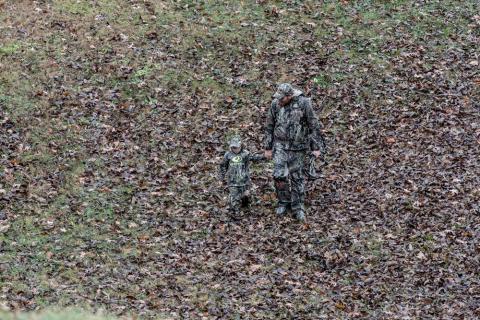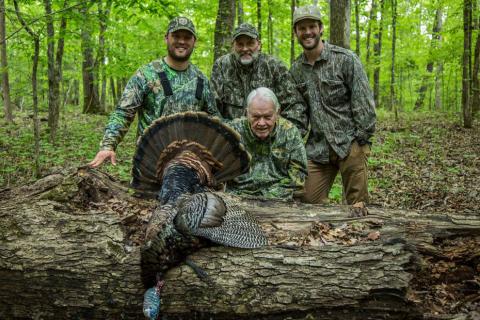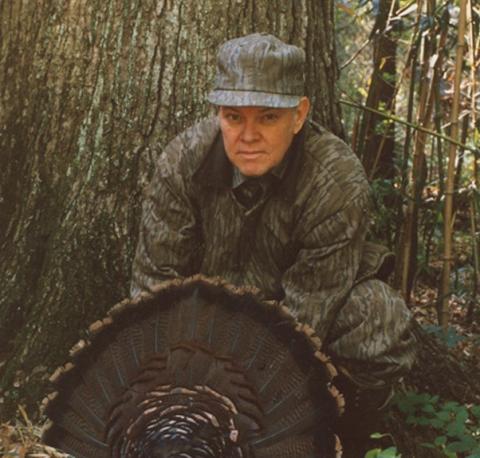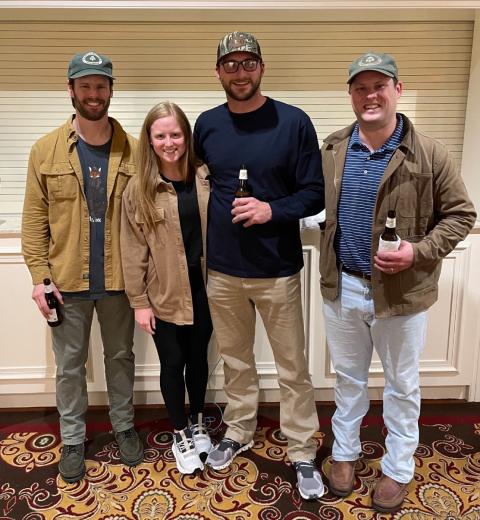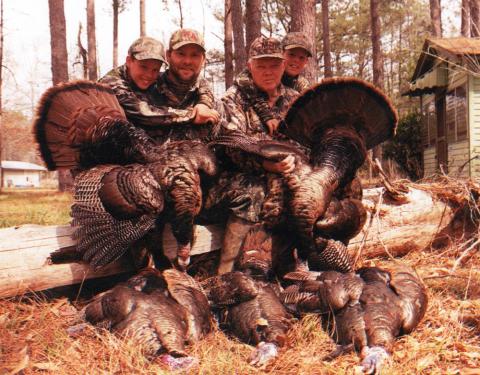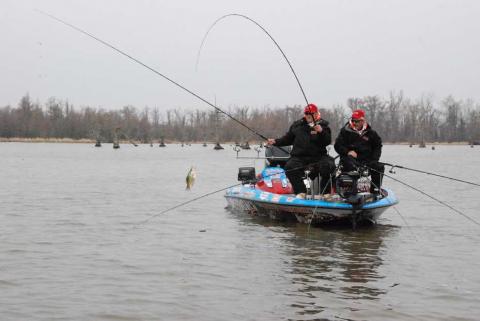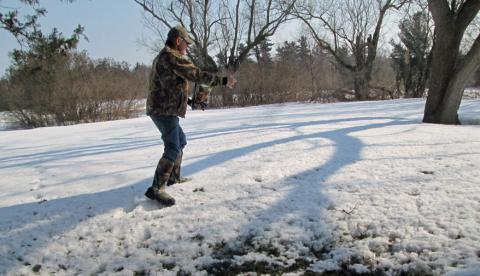provided by John E. Phillips
Ever since Mossy Oak Fishing Team member Greg Hackney of Gonzales, Louisiana, was a boy, one of the biggest advantages he always had was his dad, Roger. “My daddy was my biggest fan,” Greg Hackney explains. “He was my sponsor and put 100 percent of his effort into my fishing journey. Back then, I had two passions: fishing and working in the logging industry. I spent most of my time on the water, but working for my dad’s logging company helped me support my fishing dream.” Hackney went to college for two years with a concentration in business and dropped out because he admits, “I liked to fish too much.” Hackney is a bass angler who’s a World Champion after winning the 2018 General Tire World Championship, a Forest Wood Cup Champion in 2009 and an Elite Series Angler-of-the-Year in 2014 – earning more than $3.7 million in career earnings to date. To learn more about Hackney, visit his Facebook page.
How Greg Hackney Uses His Depth Finder
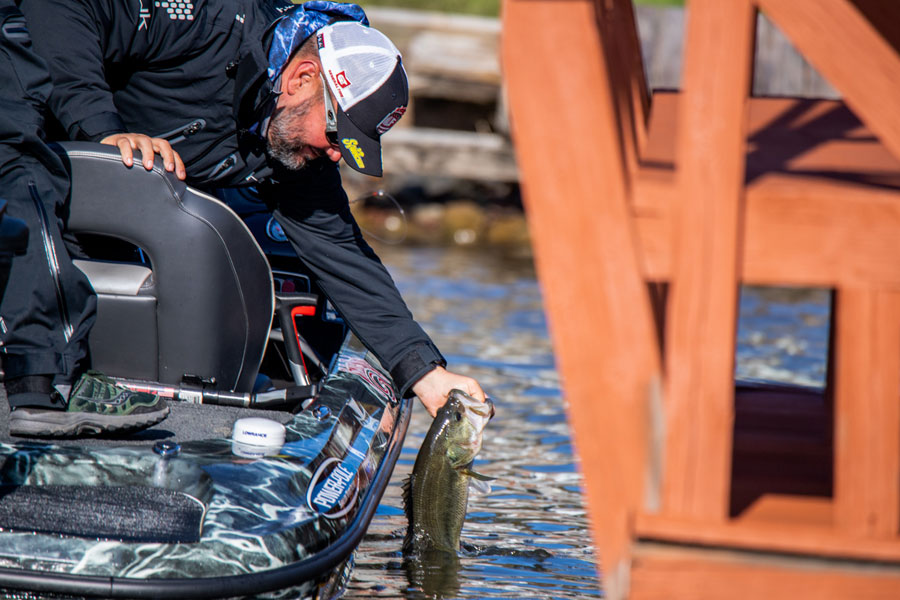
John Phillips: The depth finders we use today are very different from the ones we used years ago. Many folks are running four or perhaps even five depth finders on their boats. Each unit has multiple screens. How have you learned to adapt to the changes that have been made in the depth-finder industry?
Greg Hackney: The current depth finders have many different aspects, but they’re also so simple that all you basically have to do is turn them on and go fishing with them. I know you’ve heard of the term, “That pro is good with his electronics,” but really and truly, how good do you have to be to turn on a depth finder?
The quickest, easiest way to learn any new tactic or piece of equipment is to get someone who already uses it to teach you about it. When my depth finder company Lowrance develops a new feature for a depth finder, I just get one of the factory engineers who has developed that feature to teach me how to use it. I think it’s important to remember that when companies make new products that are great and wonderful for anglers, they have to go back and determine how they can explain to me and Joe Lunchbucket how to make those functions work easily and quickly, or they’re not going to sell it. As technology and the depth-finder industry have changed, improved and grown, so has the ability of engineers and company reps to simplify the functions on the depth finder. Then a fisherman won’t say, “Oh, that’s so complicated, I’ll never learn how to use it.” Technology is only as good as the fisherman’s ability to learn it simply, quickly and easily, and depth finders have been made so simple that if you can operate a Smartphone, you’ll have very little trouble operating the depth finders that are on the market today.
Phillips: What new features on depth finders do you use the most now?
Hackney: The one thing that’s helped me improve my bass fishing the most is the mapping features on today’s depth finders. When I first started bass fishing, we had paper topographical maps that we could study to learn where we should start fishing. But now, instead of having to pull a topo map out of a pocket in my boat, spreading it out and analyzing it to find bottom structures, all I have to do is look at the maps right in front of me on my depth-finder screen. I believe that the topographical map is the number-one screen on the depth finder that I use to find bass, but don’t get me wrong, I still can read a paper map. However, having that screen with the map on it as I’m moving down a river or a lake enables me to not only find better places to fish, but to also mark those spots. For example, let’s say I catch a bass on a ledge in 10 feet of water. I can mark that spot on my map, and it will instantly show me where there’s bottom structure at that same depth in other places of the lake. That way, I can quickly go to those areas where bass should be by just following the map on my screen.
What Greg Hackney Does to Keep from Losing a Bass
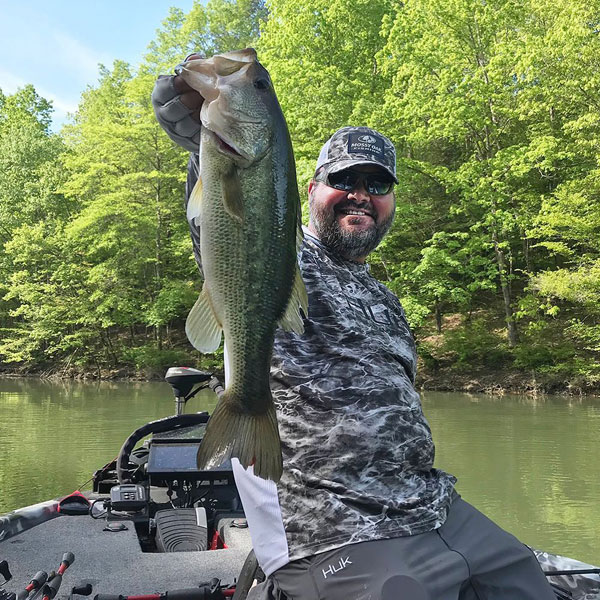
Phillips: Greg, when you’ve got a big fish on, and you know that that big bass can move you high up in the standings, but it suddenly gets off your hook – what do you do to cope?
Hackney: In the past, if I lost a big fish like that, my spirit would be crushed. I’d be aggravated, disappointed and all upset. However, I’ve learned that losing big fish is as much a part of tournament bass fishing as catching one is. So instead, I immediately think, “Okay, you’ve found the right lure, you’re in the correct depth of water on the best type of structure for that fish to be holding on, so if you keep doing the same thing, you will catch another one.”
Early in my bass-fishing career, losing a big bass hurt me much more than it does today. Losing that fish usually messed my head up for at least an hour or maybe longer. I couldn’t get over the thought of, “Oh, I wish I would’ve caught that one. He would’ve made the tournament for me. I can’t believe I lost him.” If I lose a big bass today, I can get over that tragedy in about 5 minutes. Over time, I’ve learned and decided that I won’t let losing a big bass ruin the rest of my day of fishing. When the tournament’s over, I may cry about it, but instead of being upset about the fish I’ve lost, I know I have to concentrate on the next fish I’m trying to catch.
Phillips: What can you do to keep from losing a big bass when you get it on your lure?
Hackney: The best thing you can do in that situation is keep your line tight to the fish and have all of your equipment in very good shape. That way, when you’re called on to land that fish, it’s in as good a shape as it can be for you to do that task. You also have to realize that there are some things in bass fishing that you can’t control - like a bass getting off the hook. I do everything I can to make sure that all of my equipment has the ability to bring a big bass to the boat when it takes my lure. One of the secrets to winning bass tournaments is being able to take charge of and control all the different variables that may happen throughout a day of fishing. Once those tasks of sharpening your hooks and having fresh line on your reel are done, and a bass still gets off, you’ll have to accept that the bass just beat you that day, and there’s nothing you can do about it.
Phillips: When the line’s coming up out of the water, and you know that that bass is about to jump, what do you do?
Hackney: If I’m fishing a crankbait, I may try to pull the bass and keep its head down. Anytime I have treble hooks, I’ll attempt to keep the bass from jumping. But if I’m fishing with a single hook, I know I’ve set that sharp hook hard enough that the bass shouldn’t be able to throw it, if he jumps. I put a lot of pressure on a fish (pulling hard and winding fast), so that he shouldn’t jump. When I set the hook, I try to break that fish’s will to jump. I do this by keeping its head above the water and keeping it coming out of the water like the fish is on skis.
Greg Hackney’s Favorite Equipment
Phillips: What’s your favorite flipping stick, line, lure and color?
Hackney: I like to fish a Lew’s 7-foot 11-inch Signature Hack Attack Flipping Stick with a black and blue Strike King Hack Attack Jig and 50-pound-test GAMMA braided line to flip. I’ll tie the jig straight to the braided line without using a leader. Actually the only time I use a leader is when I’m fishing braided line on a spinning rod. That’s when I like to fish a 6-foot 10-inch Hack Attack All-Purpose Spinning Rod with a Lew’s Custom Pro Spinning Reel and 10-pound GAMMA braided line tied to a 3-6 foot-long fluorocarbon leader material, not the casting style fluorocarbon line. The leader material is much stronger and abrasion-resistant than the casting line is. You’re basically not casting the leader, but instead casting the braided line. This leader material is much stronger than the fluorocarbon casting line because it has to go through a different process to make it more supple to cast easier.
Phillips: What’s your favorite lure to fish on spinning tackle, including size and color?
Hackney: I like a 1/8-ounce jig head with a Double Header Strike King Finesse Worm - my shaky-head favorite. I like it because I can skip it under boat docks and tree limbs hanging over the water, and fish it on deep ledges or underwater rock piles. I’ve caught a lot of bass on it. I even won my first Bassmaster event with this shaky-head worm.
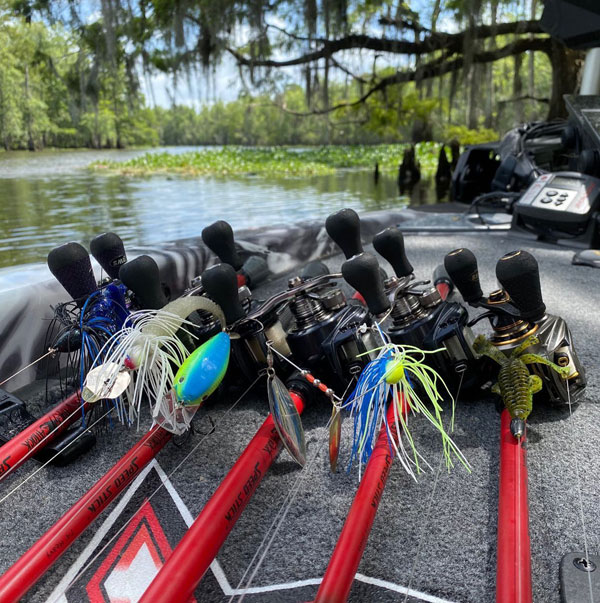
How Greg Hackney Has Fished the Major League Fishing and the Bassmaster Circuits
Phillips: Greg, you took some time off from the Bassmaster circuit to fish the Major League Fishing (MLF) Circuit and won on both. On MLF, you didn’t know what lake you were to fish until you got there. How did you adjust to not being able to study the lake before you had to fish it?
Hackney: I’ve always been, what I call, a quick study. I’m a really good visual learner in that I can see where bass should be. So, as I run down a lake, I can see things that I can fish around. When I spot what I like, my mind goes back to the many hours I’ve spent on the water fishing various lakes in different weather and water conditions. If you’ve put the time in on the water, your brain does the thinking for you. It can identify the places you want to and need to fish based on your past experiences. I’ve fished all over the nation in almost every state that has a population of bass, so I’ve stored up a lot of information on what type of cover bass like to hold on based on all the conditions that are on that lake that I’m fishing. So, regardless of where we fish across the nation, there always will be some type of cover or structure that I’ve fished before.
Since we’re given a map before we have to fish the lake, I can pick out some spots where I believe the bass are holding. I’ll also know whether we’ll be fishing a river, a lake or a watershed impoundment, how deep the water is, and where the shallow places are. Other than that, I’ll look at the bottom to see if it’s made up of sand, rocks, clay or mud, and I’ll also figure out what type of vegetation will be there - grass, lily pads or water weeds.
How To Handle Equipment Failures
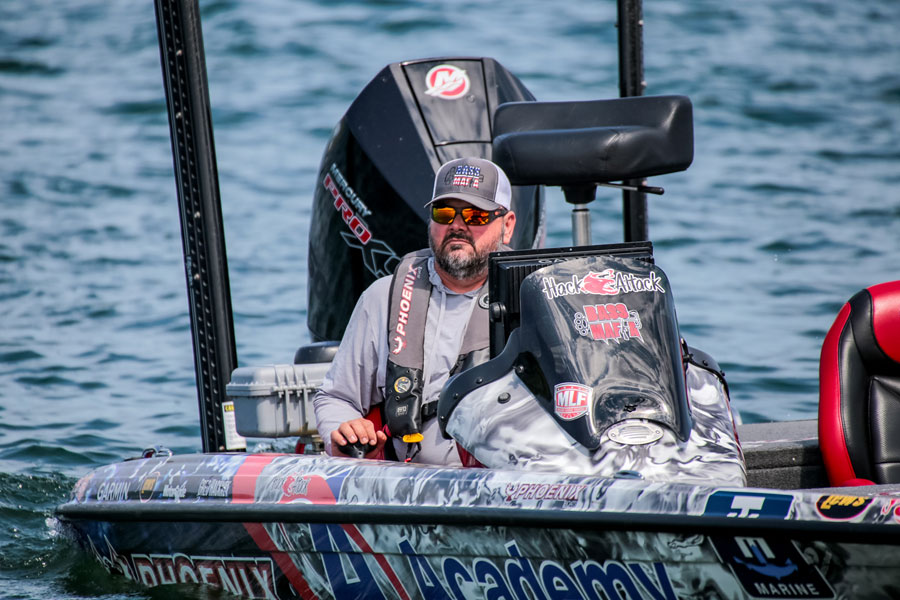
Phillips: One of the nightmares of a fisherman is having a mechanical breakdown during a tournament. How do you deal with that kind of a problem?”
Hackney: I’ll be honest. I rarely have an equipment breakdown. Since I’ve worked in the logging industry and have done mechanic work on various kinds of machinery, I keep my tools in my boat that will allow me to fix almost anything that breaks while I’m on the water. I’ve also learned that the better and more often you service your equipment, the fewer breakdowns you’ll have. I change my lower unit fluid on my motor regularly, and I try not to abuse my trolling motor or any of my other equipment. If there’s anything that has any type of little glitch in it, I try to get that problem fixed immediately, even if it’s only a minor problem. I want all my equipment to be tournament ready before I put my boat on the water to fish. I don’t procrastinate when it comes to having my equipment in the best shape possible. I fix little problems before they become major problems. There are some things that happen that aren’t in your control, but I don’t take unnecessary risks. Instead, I try to be really safe when I’m running my big engine and try to idle-down long before I’m ready to fish. I’ve learned long ago that a bass fisherman is only as good as the equipment he uses.
Phillips: What do you carry in your boat to use if there’s a problem with your equipment?
Hackney: I carry tools to fix almost any problem that my boat motor and electronics may have. I always have an extra prop for my trolling motor, jumper cables, a jump box and an extra propeller for my big motor. In the logging industry, I learned that if your equipment breaks down, your job is shut-down. The bass fisherman’s job is catching bass. No matter whether your equipment is old or new, you have to take care of it to prevent breakdowns.
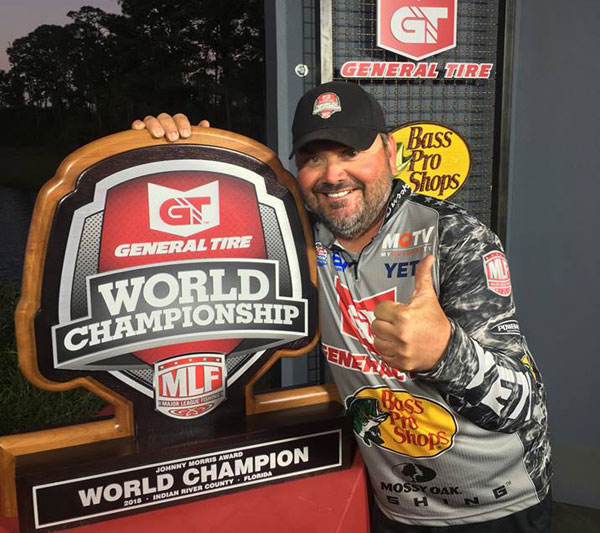
Editor’s Note: Greg Hackney has been highly successful, made a lot of money, and caught a lot of bass. He’s given us good advice on not only how to be a tournament bass fisherman, but also how to be successful each time we go fishing. Even after 20 years of practicing for and participating in tournament fishing, Hackney continues to learn new lures, tactics, and strategies to find and catch bass.
















